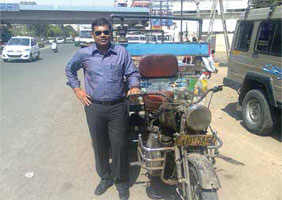
Having worked in Germany for over three years now in the field of laser technology, Kedarnath Pulipaka can talk endlessly about the German work culture. He sheds light on some of the work policies prevalent in the country, which make it conducive for professional growth
Kedarnath Pulipaka armed himself with a Master’s degree in Mechanical Engineering from Germany in 2013, after which he found his heart set on the country, the very reason why he picked up a job in Germany with laser technology as his specialisation, ‘Once you get an exposure to the culture abroad, you yearn to work outside India. Additionally, there are very limited opportunities in laser technology in India while, Germany is way ahead in this field’. He provides an insight into what he has gained from working in an alien culture: “I have learnt to be more disciplined and focused as well as manage my time well. Because of these aspects, I now know how to increase my output per hour, which has made me efficient too,” he says. The laser expert who is quite fond of biking and continues to work in Germany goes on to provide a firsthand account of working in Germany to other aspirants.
“Time is prime : This aspect is the very core of the German work culture. Everyone’s time is given due respect, the very reason why one has to schedule an appointment to meet someone during office hours. What’s more, they cannot exceed the per-decided duration of the meeting. In Germany, everything is well planned and timed. No wonder, Germans are so professional!
Comfortable working hours : Generally, the working hours are from eight in the morning to five in the evening. It is common for Germans to start work as early as 7 or 7.30 in the morning. In the country, what matters is the completion of eight hours, so there is flexibility of timings.
Working smart : Germans are not only hard working, but also smart workers, as they complete their work within the given time. It is exceptional to find them working beyond office hours as they make optimum use of the working hours, given their efficiency.
All’s fair in Germany : The work is uniformly distributed and the work is divided considering an individual’s capacity. This explains why everyone is able to finish work on time. In case an employee feels he has too much on his plate, he has the freedom to approach the manager, who is readily available. At the same time, no extra work is expected.
Low attrition rate : As there isn’t much work pressure and employees can strike a healthy balance between professional and personal life, attrition rate is much less compared to India.

Fire, fire! One of the biggest downsides of working in Germany is that you could be fired any moment for your lack of commitment to work or incapability to perform. In Germany, you are more likely to lose a job than in India.
Raises? Not much : Generally, annual raises vary from one percent to two percent. Three percent would be considered on the higher side.
Private lives are, strictly private : Mostly, colleagues do not have access to each other’s contact numbers nor is online social networking encouraged during office hours. As for the gossip mills, they are never at work.
Managers have clarity of thought and take quick decisions. They never show fear of failure and are open to experimenting with new things, obviously in consultation with the boss. That way, Germany offers quite an open culture when it comes to executing new ideas, irrespective of who they come from. As for politics on the work front, there is no room for it. Promotions and other incentives are driven purely by performance; a good rapport with your boss doesn’t fetch you brownie points. There is no tiffin system in Germany, instead, a more common practice is colleagues deciding on a mutual time convenient to everyone and going out together to have a meal.
Contrary to common belief, the dress culture in Germany is very casual. You are most likely to see everyone dressed in jeans and plain tees. The sales, marketing and finance team, however, dress up in formals for meetings with clients.

The pay is often in congruence with the cost of living. Thankfully, Germany boasts of a stable economy that witnesses a very low inflation rate, so low increment rate doesn’t make much of a difference. At the same time, new joinees are offered good pay packages which compensates for this aspect. One really looks forward to the festive season as Christmas fetches you 13 months’ bonus. Melting pot of cultures: Germany boasts of a variety of cultures. You will find people from all over the globe working here. The numbers from Turkey and China are overwhelming. However, cases of discrimination are next to zilch.
The pay is often in congruence with the cost of living. Thankfully, Germany boasts of a stable economy that witnesses a very low inflation rate, so low increment rate doesn’t make much of a difference
A weekend is a weekend! : A weekend is a weekend!: Germany follows a five day work culture. A six day working week is a strict no-no. No emails or official calls are made on weekends. Germany follows a no-work policy on weekends, barring a few exceptions. He signs off with some food for thought for Indians who aspire to work abroad. “In this day and age, it is important to expose yourself to a work culture other than your own. Therefore, be open and adaptable. Once you have made up your mind to go to another country for work, make sure you learn the language spoken there so that no communication challenges arise and you can connect better with people. It is good to always be culturally integrated. Ever heard of the famous quotation, 'Culture could eat strategy for breakfast’? Well, that very much applies to working abroad!”
By Namrata Gulati Sapra